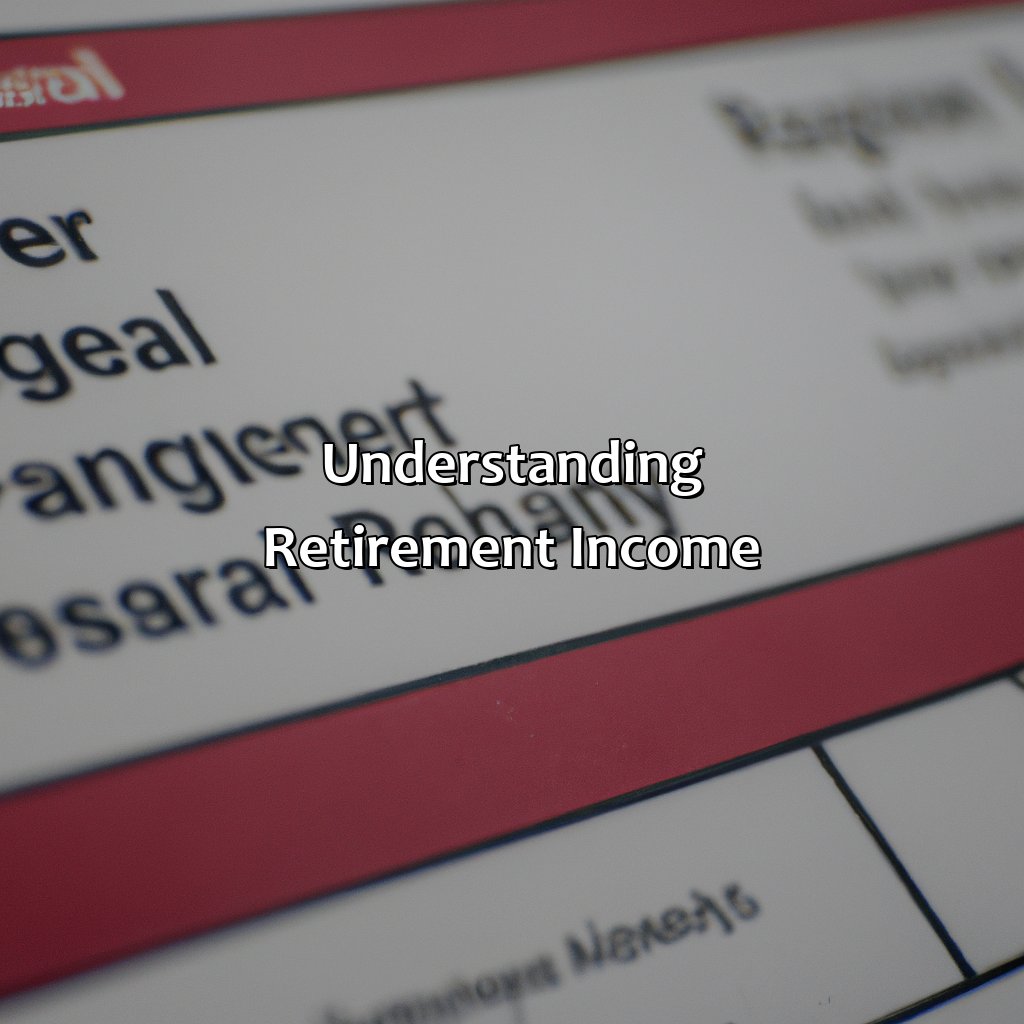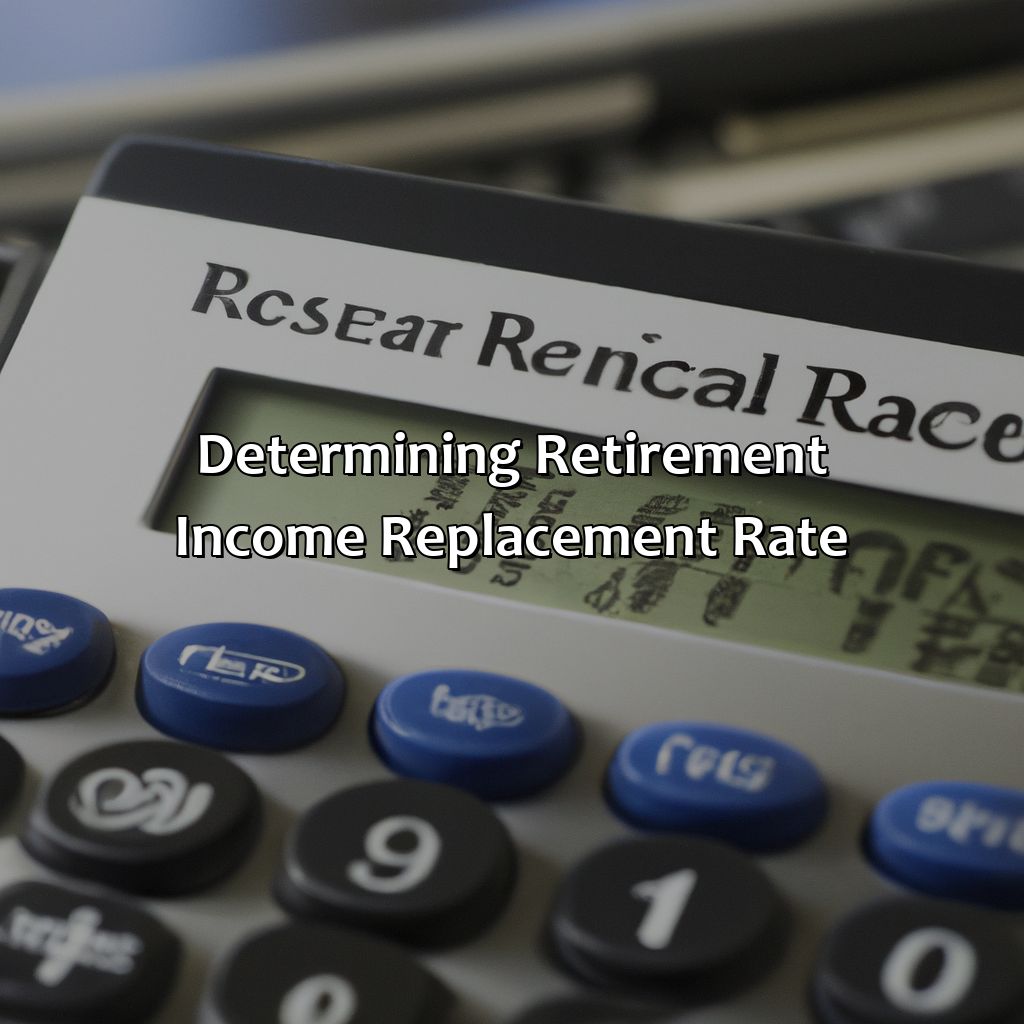What Percentage Of My Income Will I Need In Retirement?
Key Takeaway:
- Understanding sources of retirement income is essential for determining retirement income needs. These sources include social security benefits, pension plans, and personal savings and investments.
- Calculating retirement income needs involves determining basic living expenses, healthcare expenses, and travel and leisure expenses. It is important to factor in cost of living adjustments and inflation.
- The retirement income replacement rate can be determined using a rule of thumb or personalized approach. Strategies for achieving retirement income goals include saving more, delaying retirement, and downsizing. Monitoring and adjusting the retirement income plan is also important.
Are you preparing for retirement and want to know what percentage of your income you need to save? This article provides valuable advice to help you calculate and plan your retirement income. You can make sure you’re on the right track to achieving a comfortable retirement.
Understanding Retirement Income
Understanding Retirement Income: What You Need to Know
Retirement income is a crucial aspect to consider when planning for your future. Many individuals wonder what percentage of their income they will need during retirement to maintain their lifestyle. The answer varies depending on several factors such as your current expenses, retirement goals, and sources of income.
It is important to have a clear understanding of the different sources of retirement income, including Social Security, pensions, and personal savings. Each source has its own set of rules and regulations, which can affect your overall retirement income.
In addition to these sources, it is also wise to consider alternative options such as real estate investments, stocks, and annuities. Diversifying your retirement portfolio can help mitigate risk and provide additional income streams.
To ensure a comfortable retirement, consider saving at least 15% or more of your income each year. Implementing a budget and reducing unnecessary expenses can help maximize your savings potential. Working longer and delaying Social Security benefits can also increase your retirement income.
It is important to regularly review and adjust your retirement plan as needed. Consulting with a financial planner can provide additional guidance and clarity on your retirement goals and income needs. Overall, understanding retirement income is crucial for a successful retirement plan.

Image credits: retiregenz.com by Yuval Washington
Sources of Retirement Income
To comprehend the different sources of retirement income, explore ‘Sources of Retirement Income’. This solution offers ‘Social Security Benefits,’ ‘Pension Plans,’ and ‘Personal Savings and Investments’ for your retirement planning. Analyze the subsections to maximize your income after you retire.

Image credits: retiregenz.com by Harry Washington
Social Security Benefits
Retirement Benefits from Government:
The government’s retirement benefits program is a crucial safety net for retired individuals. These funds are commonly referred to as Social Security Benefits, and they form the foundation of income in most old-age scenarios. The amount received from these benefits is calculated using a complex formula that takes into account your historical earnings and current age.
Due to many economic issues, the Social Security Fund may not always be able to provide its beneficiaries with full coverage. As one of the government’s primary retirement income sources, it’s worth knowing what you can expect from these benefits.
Pro Tip: Plan accordingly when relying heavily on Social Security Benefits, as they may not cover all expenses when it comes to retirement costs.
Hope you like the taste of ramen noodles, because that’s all you’ll be affording without a decent pension plan.
Pension Plans
Retirement Benefits
Planning for retirement is crucial, and understanding your sources of income is equally important. Retirement benefits are a key element of retirement planning. They refer to payments made by an employer to their employee as compensation for their employment services. Every company has its own pension plan, which can range from a simple defined benefit plan to more complex plans like a 401(k). These pension plans help you save and invest so that you have enough money to live on when you retire.
It’s imperative to note that the type of occupation, total earnings and number of years worked determine one’s retirement income. The pension benefits vary vastly, whether they be fixed payments or periodical payments based upon a specific calculation. One must keep track of additional schemes such as loans, survivor benefits and interest rates attached to them before opting for early withdrawal.
Maximizing your savings today will prepare you for tomorrow’s uncertainties; it’s imperative not only in terms of financial security but also peace of mind. Taking appropriate measures concerning investment options like stocks, bonds, or mutual funds guarantees less stress during the golden years.
Secure your future with proper planning and ensure you don’t run out of funds even after leaving active work life. Save now, retire later, or sell your organs on the black market – the choice is yours.
Personal Savings and Investments
Investments and Personal Savings are the backbone of a solid retirement plan. These funds are accumulated over time and can offer support when traditional income sources no longer exist. It is crucial to evaluate the appropriate amount required for a comfortable retirement, which covers basic expenses and allows for leisure activities without relying on future Social Security benefits.
One must begin with understanding the expected duration of their retirement phase, analyzing potential risks along with probable rewards of multiple investment options available, such as equity funds, fixed deposits, bonds, and real estate assets. A balanced approach towards investing in diverse instruments is recommended to mitigate potential losses that may arise due to volatile changes in market scenarios.
It’s imperative to be proactive with savings put aside to accomplish long term financial goals during an individual’s prime earning years. A secure nest egg comes from setting up systematic investments through regular contributions into various portfolios based on risk appetite and current monetary requirements.
Many retirees tend to experience the dilemma of managing expenses when faced with medical emergencies or unforeseeable circumstances. To tackle this problem, certain financial tools such as annuities can be availed at pre-decided regular income producing intervals that act like paychecks for life while eliminating longevity risk.
Numerous notable personalities have historically been wise investors who ensured their economic security sustainably after retirement by making informed judgments about what proportion of income they need for their post-retirement days as a defining factor affecting how much money they should invest into money-making schemes.
Better sharpen those math skills, calculating retirement income needs is like solving a Rubik’s cube…except the stakes are higher.
Calculating Retirement Income Needs
To find out how much money you need for retirement, think of all your expenses. Split them into three parts:
- Basic Living Expenses
- Healthcare Expenses
- Travel & Leisure Expenses
This helps you to work out what income you’ll need in retirement. Knowing this makes it easier to reach your retirement savings goals.

Image credits: retiregenz.com by Joel Arnold
Basic Living Expenses
For sustained livelihood in retirement, expenses for fundamental necessities like food, shelter, and healthcare are crucial. These necessaries form an essential part of expenses in retirement and should be budgeted carefully.
The basic necessities of life such as housing, utilities, groceries, health care, transportation costs, and insurance are critical to retirees’ financial security. Neglecting these necessities may lead to compromising the quality of life in retirement.
Apart from bare essentials like housing and food, other substantial living expenses include transportation costs for daily errands or leisure activities.
To reduce unwanted expenses consider downsizing your home or relocating to another city with a lower cost of living. Medical aid programs such as Medicaid or Medicare can help if you’re concerned about limited financial resources.
In summary, cutting back on discretionary spending will allow you to save more money throughout your working years to maintain a comfortable lifestyle in your retirement. Plan well in advance to have enough saved up for risk-free investment plans that provide reliable returns and generate income throughout your golden years!
Retirement may give you more time to golf, but it won’t do anything for your joints. So don’t forget to factor in those healthcare expenses.
Healthcare Expenses
Medical Care Costs
As one gets older, the cost of healthcare rises. Medical care costs need to be considered when calculating retirement income needs. These costs can include preventative care such as doctor visits and vaccines, as well as more expensive treatments like surgeries and hospital stays.
In particular, long-term care costs are a significant consideration. Medicare does not cover long-term care, so retirees will need to plan accordingly. Long-term care covers services for people who cannot perform daily living activities without assistance and can include nursing homes or in-home care. As benefits vary widely depending on the state, it is essential to research which type of long-term plan suits personal needs.
Having a robust insurance policy is crucial in managing healthcare expenses during retirement. Many retiree’s rely on their employer’s coverage until they become eligible for Medicare at 65 years old. A Medigap policy can provide additional coverage where Medicare falls short.
To maintain good health and prevent costly medical bills in retirement, taking proactive steps to promote health is essential. These may include maintaining a healthy diet, exercising regularly, quitting smoking, reducing alcohol intake and getting preventive screenings to diagnose any illnesses early on.
Don’t worry about retirement, just hope you live long enough to enjoy your travel and leisure expenses.
Travel and Leisure Expenses
When it comes to budgeting for retirement, considering your expenses for travel and leisure activities is crucial. Retirement brings ample opportunities for socializing with friends and family, indulging in hobbies, and exploring new destinations. Allocating a significant portion of your income towards these expenses should be taken into account early on.
It’s essential to keep in mind that travel and leisure expenses differ based on personal preferences and the scope of your plans. While some might enjoy frequent extravagant trips, others may choose to stay closer to home. Furthermore, the expenses may change as you age or encounter unexpected health limitations, so regularly revisiting your budgeting plan is necessary.
Without careful planning ahead of time, overspending on leisure activities can significantly impact your post-retirement savings. However, properly allocating funds towards travel and leisure activities can improve the quality of life during retirement.
One couple from Los Angeles had planned a busy itinerary for their first few months after retirement. They spent nearly 35% of their monthly income enjoying various recreational activities. But due to unforeseen medical issues they had faced shortly thereafter; they adjusted their plans and began focusing more on local activities instead of international travel. This experience taught them the importance of flexibility when it comes to budgeting for leisure after retirement.
To ensure you have enough savings set aside for retirement travel and leisure activities, try consulting with a financial advisor or utilizing online calculators that can provide insight into monthly spending limits based on your income and expected lifestyle choices.
Retirement income replacement rate: the fancy term we use for figuring out how much of our paycheck we’ll miss when we finally clock out for good.
Determining Retirement Income Replacement Rate
To figure out your retirement income replacement rate, you can take a simple rule of thumb or go with a personalized approach. Ready-made solutions come with the rule of thumb method. On the other hand, a personalized approach considers your individual lifestyle and needs. In this section, we’ll examine the pros and cons of the rule of thumb and personalized approach methods for “Determining Retirement Income Replacement Rate“.

Image credits: retiregenz.com by Yuval Woodhock
Rule of Thumb
Determining the Estimated Percentage of Income Required in Retirement through a Commonly Used Approach
A reliable way to calculate your retirement income replacement rate is by using a widely accepted technique, which is commonly referred to as the “Rule of Thumb.” In this approach, the estimated percentage of your pre-retirement income required for retirement can be determined based on various factors such as your current age, expected years in retirement, and overall health.
To get started with this technique, consider estimating 70-80% of your pre-retirement income for comfortable living post-retirement. Additionally, analyze the anticipated expenses and lifestyle choice after retirement to get detailed insights into calculating retirement income replacement rate accurately.
Determining Retirement Income Replacement Rate: Unique Considerations
Bear in mind that not everyone will require an 80% replacement rate; some may need much more or less than that percentage. Suppose you have limited savings or many recurring debts at the end of your career. In that case, you might need to save up more compared to someone who does not have these burdens.
Call-to-Action: Don’t End Up Underfunded During Your Post-Retirement Mode
Retirement planning is complicated due to several variables like life expectancy or inflation rates. However, it’s crucial to secure a financially stable post-retirement life by starting early (even with smaller savings) and preparing yourself well enough with expert perspectives. Being knowledgeable about determining the right percentage of income replacement rate will help you avoid underfunding in post-retirement mode!
Retirement planning is like a choose your own adventure book, except instead of magic and dragons, it’s just a lot of math and anxiety.
Personalized Approach
When it comes to determining the income replacement rate for one’s retirement, a personalized approach is ideal. This takes into account individual circumstances such as lifestyle choices, expected expenses and current income levels.
One way to personalize the calculation is by analyzing anticipated expenses in retirement. Some plausible considerations include healthcare costs, housing, travel expenses and leisure activities. Another factor to keep in mind is inflation and its potential impact over time.
It is vital to note that a diversified retirement portfolio can also be helpful in achieving desired levels of replacement income in retirement. A mix of stocks, bonds and real estate options can offer stability and growth potential needed to maintain comfortable retirement life.
Retirement income goals? Just become a millionaire before you retire and you won’t have to worry about it.
Strategies for Achieving Retirement Income Goals
Gain your wanted retirement income goals! To do so, there are various strategies. These include:
- Saving more
- Delaying retirement
- Downsizing
These are possible solutions for folks searching to have a comfy financial future post retiring. Let us discuss these techniques in depth and see how they can help you reach your retirement income goals.

Image credits: retiregenz.com by Adam Washington
Saving More
To Enhance Your Retirement Income:
- Start by creating a budget.
- Reduce unnecessary expenses and save more consistently.
- Choose investment options that align with your goals and risk tolerance.
- Consider delaying retirement to increase savings and maximize Social Security benefits.
- Create multiple sources of income, such as part-time work or rental properties.
- Regularly reassess and adjust your plan as needed to keep up with changing circumstances and market conditions.
It’s essential to avoid procrastination when it comes to saving for retirement. Take action now rather than later! Consider working with a financial advisor who can guide you through the best steps to help meet your retirement goals.
True history: Numerous studies show that most Americans are not saving enough for retirement, leaving them at risk of outliving their assets. Saving more consistently early on can make a significant difference in achieving long-term financial security.
Delaying retirement is like waiting to open your Christmas presents on December 26th – it may save you money, but it’s not as exciting.
Delaying Retirement
Extending Retirement:
Working beyond planned retirement can lead to increased retirement income and reduced reliance on savings. Converting a part-time role could provide a useful balance between relaxation and productivity. Such flexibility in the workplace can allow for the continuation of private health coverage and other employer-sponsored advantages.
Individuals aged 55 and over have some compelling reasons to continue working with their company owners, including access to group health insurance, rights reserved under disability or death-income security plans, and required pension standards from corporate times.
A report by The New York Post suggests that almost half of older Americans are retiring at an age higher than 65 years old, with a further rise seen in recent years.
Ready to downsize your home and your dreams? Retirement’s the perfect time to embrace your inner minimalist.
Downsizing
Significant Reduction in Property Size
One of the most practical ways to increase your retirement income is by downsizing your property. This means selling your current home and buying a smaller one, which costs less. One should carefully examine the housing market options available to choose a smaller house that fits their needs and preferences.
By downsizing, you save on expenses like energy bills, maintenance cost, and mortgage payments (if any). It generates funds which can be used to increase retirement savings or pay off debt.
Additionally, downsized properties also help reduce living costs due to their small size. Seniors should consider this option only if they do not need more space for family members who live with them or visit frequently.
In addition, downsizing does not always mean sacrificing essential amenities like wheelchair accessibility, storage area for medical equipment, etc. By planning ahead and making informed decisions about your new home, you can ensure that it caters to your specific requirements.
Monitoring and Adjusting Retirement Income Plan
Ensuring Retirement Income Plan’s Sustainability
The key to ensuring the sustainability of your retirement income plan is regular monitoring and adjusting. It is crucial to keep track of your expenses, income sources, and investment performance to maintain a stable and comfortable retirement lifestyle.
Maintaining Retirement Plan’s Longevity
To maintain the longevity of your retirement plan, you need to adjust your investment portfolio and withdrawal strategy with changing market conditions and life events. Regular evaluations and modifications are necessary to ensure your retirement income covers your expenses for the rest of your life.
Taking Calculated Investment Risks
You may need to consider taking calculated investment risks such as stock market investments instead of traditional fixed-income investments to generate higher long-term returns. However, it is essential to diversify your investment portfolio to minimize risks.
Maximizing Retirement Income
To maximize your retirement income, consider delaying your Social Security benefits, minimizing taxable income, and generating multiple retirement income sources such as rental income, annuities, or part-time employment. Consult with a financial advisor to determine the best strategy that aligns with your retirement goals and financial situation.

Image credits: retiregenz.com by Joel Arnold
Some Facts About What Percentage of My Income I Will Need in Retirement:
- ✅ Experts typically recommend a retirement savings goal of 10-15% of your income. (Source: CNN)
- ✅ The amount you will need in retirement depends on factors such as your lifestyle, health, and expected expenses. (Source: Investopedia)
- ✅ Social security may not be enough to cover all of your retirement expenses. (Source: CNBC)
- ✅ Delaying retirement and continuing to work can increase your retirement savings and reduce the amount you will need to save overall. (Source: Forbes)
- ✅ It is important to regularly review your retirement savings plan and make adjustments as needed. (Source: AARP)
FAQs about What Percentage Of My Income Will I Need In Retirement?
What percentage of my income will I need in retirement?
The percentage of income you will need depends on a variety of factors, such as your lifestyle, expected expenses, and retirement goals. The general rule of thumb is to aim for replacing 70-80% of your pre-retirement income.
How can I calculate the percentage of income I need in retirement?
You can begin by estimating your living expenses and determining how much money you will need to maintain your lifestyle in retirement. Once you have a target number, you can divide that by your pre-retirement income to get a percentage.
Will my retirement income be enough to cover my expenses?
It’s important to plan and save for retirement to ensure that your income will be sufficient. Consider working with a financial advisor to develop a retirement plan that will help you reach your goals.
What are some ways I can increase my retirement income?
You can increase your retirement income by working longer, maximizing your retirement contributions, starting a side business, and investing wisely. A financial advisor can help you determine the best strategy for your situation.
Is it possible to retire without any savings?
While it’s possible to retire without savings, it is not recommended as it can lead to financial struggles later in life. Consider developing a savings plan and working with a financial advisor to ensure a comfortable retirement.
How do I know if I am on track for retirement?
You can assess your retirement readiness by reviewing your savings, calculating your expected expenses, and projecting your retirement income. A financial advisor can help you determine if you are on track and make any necessary adjustments to your plan.





